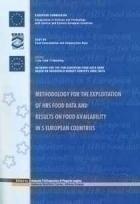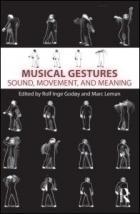
COST Projects - Collected Agreements Vol 2 1981-1982 Greek Language Edition

COST Chemistry Action - Activity Report

Waterbased Inks and Deinking

Methodology for the Exploitation of HBS Food Data and Results on Food Availability in 5 European Countries

Materials for Sea Water Desalination Plants

Potential for Increasing Plant Performance in the Phytoremediation of Organic Polluants

Ageing and Technology: The Outdoor Mobility of Older People - Technological Support and Future Possibilities

Musical Gestures: Sound, Movement And Meaning
- Pages: 307
- Author(s): R. I. Godoy and M. Leman
- Publisher(s): Routledge
- http://www.routledgemusic.com/books/Musical-Gestures-isbn9780415998871
- ISBN/ISSN: 978-0-415-99886-4
Musical Gestures is a collection of essays addressing the fundamental issues of gesture research in relation to music. This includes different approaches to what musical gestures are about, analyses of the relationships between gestures and sound, the relationships between performance and perception of gestures, and their significance and use in cultural contexts. It takes an interdisciplinary approach to these issues, drawing on ideas, theories, and methods from disciplines such as musicology, music perception, human movement science, cognitive psychology, and computer science.

Managing Institutional Complexity – Regime Interplay and Global Environmental Change
- Author(s): S. Oberthür and O.Schram Stokke (Eds)
- Publisher(s): The MIT Press
- http://mitpress.mit.edu/catalog/item/default.asp?ttype=2&tid=12696
- ISBN/ISSN: 978-0-262-51624-2
Institutional interaction and complexity are crucial to environmental governance and are quickly becoming dominant themes in the international relations and environmental politics literatures. This book examines international institutional interplay and its consequences, focusing on two important issues: how states and other actors can manage institutional interaction to improve synergy and avoid disruption; and what forces drive the emergence and evolution of institutional complexes, sets of institutions that cogovern particular issue areas.
The book, a product of the Institutional Dimensions of Global Environmental Change research project (IDGEC), offers both theoretical and empirical perspectives. Chapters range from analytical overviews to case studies of institutional interaction, interplay management, and regime complexes in areas including climate change, fisheries management, and conservation of biodiversity. Contributors discuss such issues as the complicated management of fragmented multilateral institutions addressing climate change; the possible “chilling effect” on environmental standards from existing commitments; governance niches in Arctic resource protection; the relationships among treaties on conservation and use of plant genetic resources; causal factors in cross-case variation of regime prevalence; and the difficult relationship between the World Trade Organization and multilateral environmental agreements. The book offers a broad overview of research on interplay management and institutional complexes that provides important insights across the field of global environmental governance.
